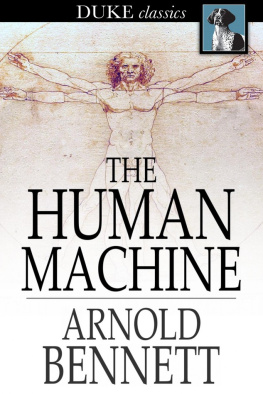Arnold Bennett - The Human Machine
Here you can read online Arnold Bennett - The Human Machine full text of the book (entire story) in english for free. Download pdf and epub, get meaning, cover and reviews about this ebook. publisher: Duke Classics, genre: Art. Description of the work, (preface) as well as reviews are available. Best literature library LitArk.com created for fans of good reading and offers a wide selection of genres:
Romance novel
Science fiction
Adventure
Detective
Science
History
Home and family
Prose
Art
Politics
Computer
Non-fiction
Religion
Business
Children
Humor
Choose a favorite category and find really read worthwhile books. Enjoy immersion in the world of imagination, feel the emotions of the characters or learn something new for yourself, make an fascinating discovery.
- Book:The Human Machine
- Author:
- Publisher:Duke Classics
- Genre:
- Rating:4 / 5
- Favourites:Add to favourites
- Your mark:
- 80
- 1
- 2
- 3
- 4
- 5
The Human Machine: summary, description and annotation
We offer to read an annotation, description, summary or preface (depends on what the author of the book "The Human Machine" wrote himself). If you haven't found the necessary information about the book — write in the comments, we will try to find it.
In this delightful volume of insightful and good-humored advice, motivational writer Arnold Bennett points out that for all of the time we humans dedicate to learning, very little of that time is spent endeavoring to elucidate helpful points for living life well, and to the fullest. Its a sad state of affairs that Bennett sets out to remedy in The Human Machine.
The Human Machine — read online for free the complete book (whole text) full work
Below is the text of the book, divided by pages. System saving the place of the last page read, allows you to conveniently read the book "The Human Machine" online for free, without having to search again every time where you left off. Put a bookmark, and you can go to the page where you finished reading at any time.
Font size:
Interval:
Bookmark:

From a 1913 edition
ISBN 978-1-62011-334-9
Duke Classics
2012 Duke Classics and its licensors. All rights reserved.
While every effort has been used to ensure the accuracy and reliability of the information contained in this edition, Duke Classics does not assume liability or responsibility for any errors or omissions in this book. Duke Classics does not accept responsibility for loss suffered as a result of reliance upon the accuracy or currency of information contained in this book.
There are men who are capable of loving a machine more deeply than theycan love a woman. They are among the happiest men on earth. This is nota sneer meanly shot from cover at women. It is simply a statement ofnotorious fact. Men who worry themselves to distraction over theperfecting of a machine are indubitably blessed beyond their kind. Mostof us have known such men. Yesterday they were constructing motorcars.But to-day aeroplanes are in the airor, at any rate, they ought to be,according to the inventors. Watch the inventors. Invention is notusually their principal business. They must invent in their spare time.They must invent before breakfast, invent in the Strand between Lyons'sand the office, invent after dinner, invent on Sundays. See with whatardour they rush home of a night! See how they seize a half-holiday,like hungry dogs a bone! They don't want golf, bridge, limericks,novels, illustrated magazines, clubs, whisky, starting-prices, hintsabout neckties, political meetings, yarns, comic songs, anturic salts,nor the smiles that are situate between a gay corsage and a picture hat.They never wonder, at a loss, what they will do next. Their eveningsnever dragare always too short. You may, indeed, catch them at twelveo'clock at night on the flat of their backs; but not in bed! No, in ashed, under a machine, holding a candle (whose paths drop fatness) up tothe connecting-rod that is strained, or the wheel that is out of centre.They are continually interested, nay, enthralled. They have a machine,and they are perfecting it. They get one part right, and then anothergoes wrong; and they get that right, and then another goes wrong, and soon. When they are quite sure they have reached perfection, forth issuesthe machine out of the shedand in five minutes is smashed up, togetherwith a limb or so of the inventors, just because they had been quitesure too soon. Then the whole business starts again. They do not giveupthat particular wreck was, of course, due to a mere oversight; thewhole business starts again. For they have glimpsed perfection; theyhave the gleam of perfection in their souls. Thus their lives run away.'They will never fly!' you remark, cynically. Well, if they don't?Besides, what about Wright? With all your cynicism, have you neverenvied them their machine and their passionate interest in it?
You know, perhaps, the moment when, brushing in front of the glass, youdetected your first grey hair. You stopped brushing; then you resumedbrushing, hastily; you pretended not to be shocked, but you were.Perhaps you know a more disturbing moment than that, the moment when itsuddenly occurred to you that you had 'arrived' as far as you ever willarrive; and you had realised as much of your early dream as you everwill realise, and the realisation was utterly unlike the dream; themarriage was excessively prosaic and eternal, not at all what youexpected it to be; and your illusions were dissipated; and games andhobbies had an unpleasant core of tedium and futility; and the idealtobacco-mixture did not exist; and one literary masterpiece resembledanother; and all the days that are to come will more or less resemblethe present day, until you die; and in an illuminating flash youunderstood what all those people were driving at when they wrote suchunconscionably long letters to the Telegraph as to life being worthliving or not worth living; and there was naught to be done but face thegrey, monotonous future, and pretend to be cheerful with the worm ofennui gnawing at your heart! In a word, the moment when it occurred toyou that yours is 'the common lot.' In that moment have you notwisheddo you not continually wishfor an exhaustless machine, amachine that you could never get to the end of? Would you not give yourhead to be lying on the flat of your back, peering with a candle, dirty,foiled, catching coldbut absorbed in the pursuit of an object? Haveyou not gloomily regretted that you were born without a mechanical turn,because there is really something about a machine...?
It has never struck you that you do possess a machine! Oh, blind! Oh,dull! It has never struck you that you have at hand a machine wonderfulbeyond all mechanisms in sheds, intricate, delicately adjustable, ofastounding and miraculous possibilities, interminably interesting! Thatmachine is yourself. 'This fellow is preaching. I won't have it!' youexclaim resentfully. Dear sir, I am not preaching, and, even if I were,I think you would have it. I think I can anyhow keep hold of yourbutton for a while, though you pull hard. I am not preaching. I amsimply bent on calling your attention to a fact which has perhaps whollyor partially escaped younamely, that you are the most fascinating bitof machinery that ever was. You do yourself less than justice. It issaid that men are only interested in themselves. The truth is that, as arule, men are interested in every mortal thing except themselves. Theyhave a habit of taking themselves for granted, and that habit isresponsible for nine-tenths of the boredom and despair on the face ofthe planet.
A man will wake up in the middle of the night (usually owing to someform of delightful excess), and his brain will be very active indeed fora space ere he can go to sleep again. In that candid hour, after theexaltation of the evening and before the hope of the dawn, he will seeeverything in its true coloursexcept himself. There is nothing like asleepless couch for a clear vision of one's environment. He will see allhis wife's faults and the hopelessness of trying to cure them. He willmomentarily see, though with less sharpness of outline, his own faults.He will probably decide that the anxieties of children outweigh the joysconnected with children. He will admit all the shortcomings ofexistence, will face them like a man, grimly, sourly, in a sturdydespair. He will mutter: 'Of course I'm angry! Who wouldn't be? Ofcourse I'm disappointed! Did I expect this twenty years ago? Yes, weought to save more. But we don't, so there you are! I'm bound to worry!I know I should be better if I didn't smoke so much. I know there'sabsolutely no sense at all in taking liqueurs. Absurd to be ruffled withher when she's in one of her moods. I don't have enough exercise. Can'tbe regular, somehow. Not the slightest use hoping that things will bedifferent, because I know they won't. Queer world! Never really what youmay call happy, you know. Now, if things were different ...' He losesconsciousness.
Observe: he has taken himself for granted, just glancing at his faultsand looking away again. It is his environment that has occupied hisattention, and his environment'things'that he would wish to have'different,' did he not know, out of the fulness of experience, that itis futile to desire such a change? What he wants is a pipe that won'tput itself into his mouth, a glass that won't leap of its own accord tohis lips, money that won't slip untouched out of his pocket, legs thatwithout asking will carry him certain miles every day in the open air,habits that practise themselves, a wife that will expand and contractaccording to his humours, like a Wernicke bookcase, always complete butnever finished. Wise man, he perceives at once that he can't have thesethings. And so he resigns himself to the universe, and settles down to apermanent, restrained discontent. No one shall say he is unreasonable.
Font size:
Interval:
Bookmark:
Similar books «The Human Machine»
Look at similar books to The Human Machine. We have selected literature similar in name and meaning in the hope of providing readers with more options to find new, interesting, not yet read works.
Discussion, reviews of the book The Human Machine and just readers' own opinions. Leave your comments, write what you think about the work, its meaning or the main characters. Specify what exactly you liked and what you didn't like, and why you think so.






